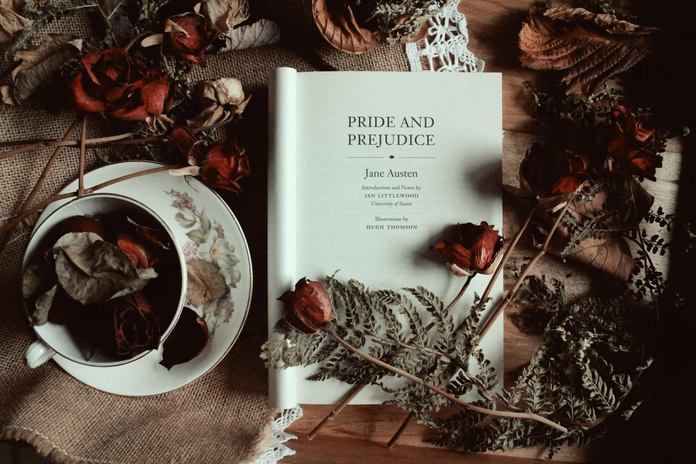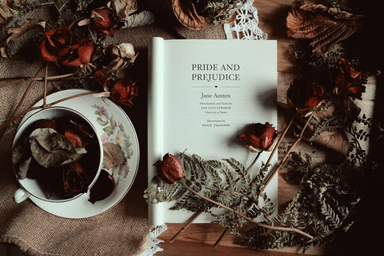I’m going crazy. Crazy for Jane Austen, that is. In hindsight, it has been a gradual descent into madness—anyone could’ve seen it coming. My first mistake was enrolling in an English class devoted entirely to reading her novels. I truly believed it would be a lighthearted indulgence of my favorite author of my favorite genre. But things have gotten out of control. My second mistake was watching each film adaptation immediately after finishing the novel. I must learn to let my brain breathe, give some space between my intake of stories, pace myself. Despite my frenzy, I’ve collected a handful of takeaways. From each novel of Jane Austen’s I have pulled my favorite quotes—truths about the world that I want to remember. I’m here to share them with you and bring some peace to my mind.
“The person, be it gentleman or lady, who has not pleasure in a good novel, must be intolerably stupid.”
Northanger Abbey, from where this quote originates, was the first novel Jane Austen ever finished. At the time, she was in her early twenties and sold the manuscript to a publisher who (unbeknownst to her) refused to publish it. For more than a decade, Northanger Abbey did not belong to the author, until her brother bought it back and officially published the novel after her death in 1817. Though the last to be published, Northanger Abbey is the writing of Austen’s unadulterated youth. It’s satirical yet critical and cheeky yet blunt. The quote above is a perfect example. Expressed by the heroine’s love interest, Henry Tilney, a truth about reading novels is stated.
“I wish as well as every body else to be perfectly happy; but like every body else it must be in my own way.”
I believe some of Jane Austen’s greatest lines are in Sense and Sensibility. It was her first officially published novel and she often referred to it as her “child.” The story is a long one, revolving around a cast of characters and the minutiae of their lives. This quote is from one of the more lackluster characters, Edward Ferrars, whose only ambition is to live a simple life. Yet, this idea he’s articulating reverberates throughout the rest of the novel. Individuality, freedom of expression, and happiness are core themes of Sense and Sensibility, and I also believe of life itself.
“I cannot fix on the hour, or the spot, or the look, or the words, which laid the foundation. It was too long ago. I was in the middle before I knew that I had begun.”
I’ve chosen this quote from Pride and Prejudice simply because I don’t know if I have ever read a more beautiful string of sentences. It’s not a universal truth per se, but the concept is so striking. The context may be familiar to you—it is how Mr. Darcy replies to Elizabeth when she asks him at what point he fell in love with her.
“There will be little rubs and disappointments everywhere, and we are all apt to expect too much; but then, if one scheme of happiness fails, human nature turns to another; if the first calculation is wrong, we make a second better: we find comfort somewhere.”
Mansfield Park is actually my favorite Austen novel. It stands alone from the others, tackling greater topics and broader realities. Austen’s other heroines are (or become) strong and independent; the heroine of Mansfield Park, Fanny, is not quite so, but that doesn’t make her any less of a protagonist. Another thing I like about the novel is the sporadic philosophical bits of dialogue, which includes the quote above. This quote is spoken by a fairly minor character, yet the idea she conveys is certainly a universal truth.
“You must be the judge of your own happiness.”
In my opinion, it is Emma that is the brightest and sparkliest of Austen’s works. It has never been my favorite, but it definitely may be the funniest novel. The character of Emma Woodhouse is vain and naïve, and much of the story is spent trying to ground her. I find that Mr. Knightley has the most noteworthy lines, although this one by Emma is as wise as she gets. Again, Austen is making a statement about happiness and individuality, which sneaks itself into everything she writes.
“Men have had every advantage of us in telling their own story. Education has been theirs in so much higher a degree; the pen has been in their hands. I will not allow books to prove anything.”
Published posthumously, Persuasion was the last novel Austen penned. It is a tale of a woman later in life, similar to Austen at the time, who is reminded of her youth by the man she once loved. At its core, Persuasion is about waiting and learning — a much more mature take than the other novels. I am particularly fond of this quote because it comes during a scene in which our demure heroine, Anne, argues with a well-read man about the failings of literature for women. It’s also highly ironic; Austen is battling her own profession with “I will not allow books to prove anything.” At this point I must disagree.
Though her words exude satire, serious understandings and universal truths are hidden within. And no matter how many times I read Austen’s novels, I always find more to learn. There is an endless amount of knowledge to acquire, sentences to pick through, and history to delve into surrounding Jane Austen that I can’t begin to scratch the surface with this article. So, here I am sharing what I know to be true in this way it is off my chest. Now my brain can breathe.





